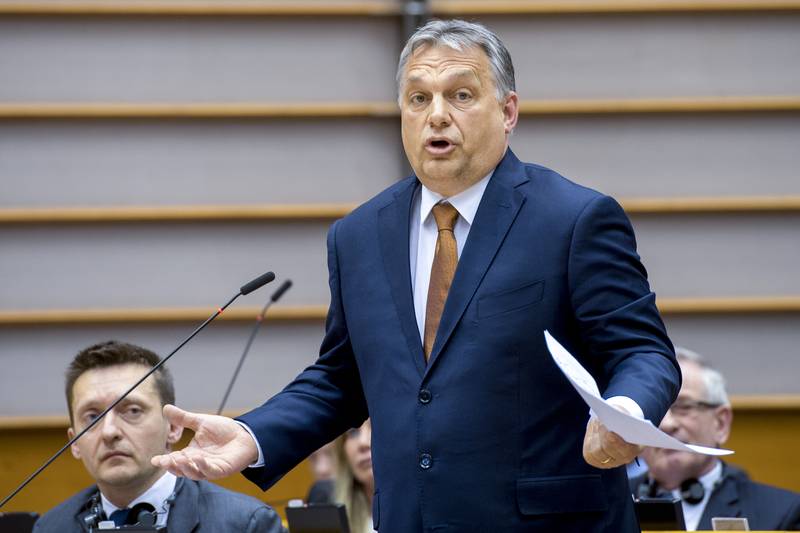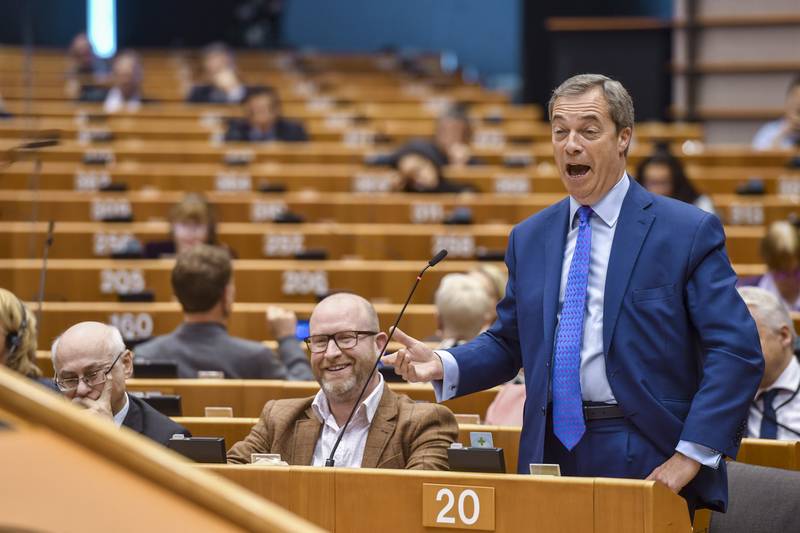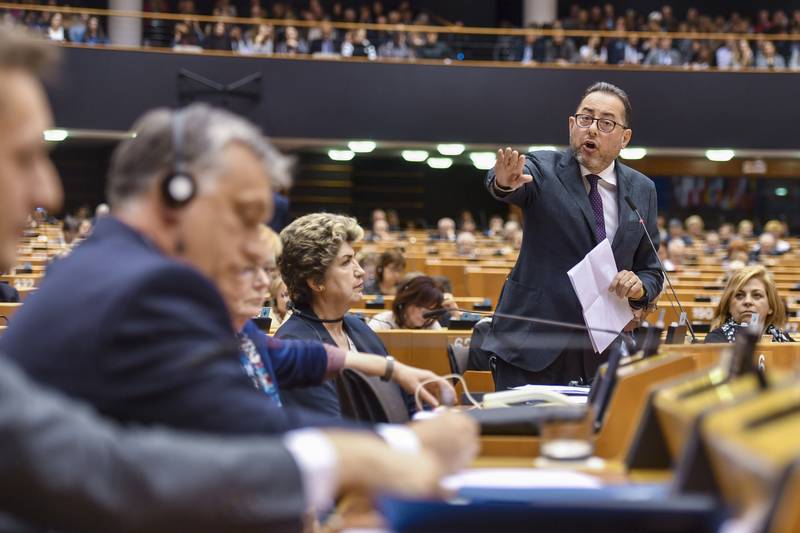Is Hungary the Next Britain?
Adelina Marini, April 28, 2017
 The European Union has finally stopped tolerating the abuse of its liberal system of values and the building of illiberal regimes under its nose. Once the EPP had declared that it is ready to split with Hungarian Prime Minister Viktor Orbán's Fidesz party, the European Commission began dealing with a number of long-standing problems that have so far slipped between the drops thanks to the majority of the EPP in the Commission, the Council, and the European Parliament. Alas, the Commission is still refraining from triggering the rule of law mechanism, as it did with Poland, and instead offers a political dialogue with Budapest. Part of this dialogue was the debate in the European Parliament on April 26, in which Prime Minister Viktor Orbán also took part. For the first time in many years, pro-European forces seemed to be fully consolidated and mobilised and rose to the level required by the situation.
The European Union has finally stopped tolerating the abuse of its liberal system of values and the building of illiberal regimes under its nose. Once the EPP had declared that it is ready to split with Hungarian Prime Minister Viktor Orbán's Fidesz party, the European Commission began dealing with a number of long-standing problems that have so far slipped between the drops thanks to the majority of the EPP in the Commission, the Council, and the European Parliament. Alas, the Commission is still refraining from triggering the rule of law mechanism, as it did with Poland, and instead offers a political dialogue with Budapest. Part of this dialogue was the debate in the European Parliament on April 26, in which Prime Minister Viktor Orbán also took part. For the first time in many years, pro-European forces seemed to be fully consolidated and mobilised and rose to the level required by the situation.
The debate has become a clash of values, during which the fight against alternative facts finally took its deserved place. The discussion, lasting an hour and a half, outlined very clearly the division between pro-European forces and Eurosceptics. All Eurosceptic political groups - the European Conservatives and Reformists, Europe of Freedom and Direct Democracy and Europe of Nations and Freedom - defended Viktor Orbán and his politics, while even his own political group, the EPP, turned against him.
Either in the EU or out
On 26 April, the European Commission opened an infringement procedure against Hungary for the Higher Education Act, which the EC believes is incompatible with the fundamental freedoms of the internal market, especially the freedom to provide services and the freedom of establishment, as well as with the right to education and conducting business. The EC sent a formal notification to the Hungarian government and expects a response within a month. On the other issues that concern the Commission, namely asylum, the law against non-governmental organisations and the national campaign "Stop Brussels", the European Commission is launching a political dialogue. The Hungarian government has organised a national poll this month by sending every household a questionnaire titled "Stop Brussels", which, according to the EC, is not based on facts. On this occasion, the Commission published a disproval of the false statements in the questionnaire.
Some of them were listed quite on purpose by the first vice president of the Commission responsible for the rule of law, Frans Timmermans (Netherlands, Socialists and Democrats), during the live streamed debate in the European Parliament. "Brussels wants to force Hungary to abolish the reduction in public utility charges" is one of the claims in the national poll, which was confirmed by Viktor Orbán himself. "We don't want to lose our national sovereignty to set public utility prices because we're afraid this will increase the financial burden of the citizens", the Hungarian prime minister said. However, according to the EC, the best way to achieve low prices is by creating competitive energy markets, working for energy efficiency and innovation. "That's at the core of the Energy Union proposals", Mr Timmermans explained.

"Brussels wants to force Hungary to let in illegal immigrants" is another statement in the questionnaire. On this issue Mr Orbán once again resorted to national sovereignty to explain that the Hungarians have the right to decide by themselves who they want to live with. He has repeatedly emphasised on Christian values, which brought serious criticism from MEPs. "We reserve ourselves the right who we welcome in Hungary and who we live together with. George Soros and his NGOs want to let in one million migrants to the EU every year", he said.
"Again, the reality is that the European Union is fighting irregular migration and is actively helping Member States to manage their external borders and return irregular migrants who have no right to stay in the EU. But irregular migration needs to be distinguished from seeking asylum. We have a shared responsibility to live up to our international obligations to protect people fleeing war and persecution and treat them fairly and with dignity", is the EC's answer. It reminds that in 2015 Hungary was under enormous refugee pressure and that in September of that year the EC proposed to relocate 54,000 asylum seekers from Hungary to other member states but this proposal was rejected by the Hungarian government.
MEP Philippe Lamberts (Greens / EFA, Belgium) said that as a Christian he did not find anywhere in the Gospel that a foreigner should be locked and returned. "What I read there is that we must accept and defend."
Another inaccurate claim the Commission has found in the Hungarian questionnaire is that illegal migrants are encouraged to commit illegal acts not only by traffickers but also by some international organisations. "The European Union has zero tolerance for human trafficking and has taken action for many years to combat this heinous crime. Saving lives at sea and looking after vulnerable people who are in need of international protection is not the same thing as promoting irregular migration. There is no evidence whatsoever of NGOs working with criminal smuggling networks to help migrants enter the EU", said Frans Timmermans.
The questionnaire also states that more and more organisations supported from abroad work in Hungary to interfere in domestic affairs in a non-transparent manner. Viktor Orbán explained that on this issue Hungary adopted the US model. He pointed out that other European countries are also looking for ways to ensure that rich lobbies do not influence the democratic process of decision-making through non-governmental organisations. "We want to introduce transparency. All we want is to know what financial and other interests these NGOs represent", he said. The Commission in this case responds that regulating the work of NGOs in general is a matter of national legislation, but reminds that the EU has strict rules on transparency and lobbying in the European institutions.
Many MEPs reminded Viktor Orbán that he himself received a grant from George Soros to study liberal philosophy in Oxford, including Monica Macovei (ECR, Romania). According to Orbán, however, this does not mean that one must have the same vision forever. He argues that George Soros, as a US financial speculator, is an open enemy  of the euro, deliberately attacking Hungary and destroying the lives of millions of Europeans with his financial speculations, for which he was fined in Hungary.
of the euro, deliberately attacking Hungary and destroying the lives of millions of Europeans with his financial speculations, for which he was fined in Hungary.
The European Commission also exposed as being untrue the allegations that Brussels is attacking Hungary's job creation and tax cuts, reminding that the tax rules are negotiated unanimously in the EU, which means that Hungary has voted for them. “The EU has agreed only minimum VAT levels. It is the Hungarian government that has decided to set the rate at 27% – which is the highest in the EU“, reminded Frans Timmermans.
Ave, dictator!
Viktor Orbán began his speech by belittling the efforts of the European Parliament so far to criticise Hungary. He explained that the debate is between Hungary, the EU and a US financial speculator. He then went on to enumerate Hungary's economic successes and finally announced that criticism of the possible closure of Central European University was absurd. "It's like someone being accused of murder then he's convicted while the alleged victim is live and kicking, moreover even pointing fingers at the convicted", Viktor Orbán illustrated the situation. He explained that minor amendments were made to the law affecting 28 foreign universities in Hungary in order to catch up with the rules and remove loopholes in legislation.
Regarding the national consultation, he recommended that all countries hold such consultations because they were very useful. "In many aspects we're unhappy with how the EU works", he said, but stressed that Hungary's EU membership is unconditional. From his speech, however, it became clear that he disagrees with many of the policies being negotiated. According to him, the goal of the “Stop Brussels“ campaign is protecting the rules already adopted. At the same time, he reiterated his well-known belief that he prefers an alliance of strong states in which they are themselves responsible for their public debt, budget, or border protection. This is a thesis, which is very close to the behaviour of the UK. The difference is, however, that when negotiating some European legislation Britain stated right from the start that it did not want to take part in it.
EPP group leader Manfred Weber (Germany) stated that the questions in the consultation are not about getting citizens' opinions, but about creating dissent with the EU. He reminded that it is not bureaucrats who make decisions in Brussels, but elected politicians. "We will not tolerate stirring dissent", said Weber and asked who funds such initiatives, which was strongly applauded in the plenary in Brussels. Socialists and Democrats Group leader Gianni Pittella (Italy) turned things into a political squabble with the EPP, urging them to kick out Orbán's party. Liberals group leader Guy Verhofstadt (Belgium) went even further by asking what Orbán's next step would be - burning books in front of Parliament or something else. "I see the modern day version of old communist Hungary - economic protectionism, extreme nationalism, the search of illiberal state and you see enemies everywhere in the Hungarian state", he said and compared the situation with the times of Stalin or Brezhnev.
Verhofstadt was outraged that Orbán accepts European money but does not accept the values of the Union. "I have more respect for the decency of the sceptics who at least say 'I don't like the EU, I don't like the values and we want to go out"'. Viktor Orbán has strongly disagreed with presenting EU funds as a handover to Hungary and recalled that net donors also benefit from EU funds. One of the strongest speeches during the debate was that of Belgian MEP Philippe Lamberts, who was outraged by the comparisons made between the EU and the USSR. "Come on, if Brussels were Moscow we would have tanks from the EU in London right now", he said.
"I am struck by the fact that a number of the laws that you are passing in your country find their inspiration in Putin's inspiration, which is hardly anybody's dream. If my party had a 2/3 majority three times I would not be afraid of media, because it would stimulate the public debate in the country and mobilise the collective intelligence. I would not be afraid of a strong and independent judiciary, because checks and balances is what we need in democracy. I would not be afraid of a vibrant civil society, because it would help me spotting problems in advance that I need to solve. I would not be afraid of leading universities, because they nurture talent in my country and I would say even better that some of the funding comes from abroad, because it enriches my country. Not only I won't be afraid but I would cherish them, because I think they will help me deliver a better society for my citizens. So, really, what are you afraid of?", were the words of the Belgian MEP.
Other MEPs have asked the EC to directly trigger Article 7 of the EU Treaty. According to Sophie in 't Veld (ALDE, The Netherlands), there is already a systemic threat to the rule of law in Hungary. Judith Sargentini (Green/EFA, The Netherlands) questioned how realistic it is to expect Mr Orbán to change his views suddenly. She called for Article 7 to be triggered, which would also challenge the Council. A call for Article 7 came also from the Austrian MEP Ulrike Lunacek, also from the Group of the Greens and the European Free Alliance.

There were attacks from other MEPs from Orbán's political family, the EPP. Frank Engel (EPP, Luxembourg) said the only goal in the measures against NGOs is to show that they are foreign, which means bad. "But if all foreign influence is so bad, why do you accept the payment of 5 bn euros annually, as the big net recipient of European structural funds, in order to plaster the whole country with posters in which you call Brussels 'crap'?", The MEP asked. The Czech MEP from the same group, Michaela Šojdrová, responded to Orban's appeal that other countries also hold national consultations. "Have you consulted your citizens on the university law? Because what you propose is disastrous for them". Roberta Metsola (EPP, Malta) recalled that the EU is not a menu to choose from, but is a collection of countries sharing the same intrinsic values and believing in their sincere cooperation.
Support for Orbán came from the Eurosceptic groups. Zdzisław Krasnodębski (ECR, Poland) reminded that Hungary and Poland were pioneers of freedom in Europe at a time when Western states were more interested in signing pacts with the USSR and Western universities taught Marxism. "We don't need your preachings about freedom and democracy". He agreed that civil society is the foundation of democracy, but warned that it should not become a colonial or post-colonial society, as was often the case in Central Europe. Soros does not hide his political ambitions, the Polish MEP warned.
To Hungary's defence also rose British MEP Nigel Farage, who once again reiterated his untruthful assertion that non-elected bureaucrats dictate to a democratically elected leader what to do. He said that Hungary would never be sovereign while in the EU. Orbán also received support from the Europe of Nations and Freedom group. The Hungarian PM thanked at the end of the debate all those who expressed solidarity with Hungary. He accused Hungarian MEPs from opposition groups of attacking their homeland in Brussels. According to him, there are attempts to provoke split in the EPP, which, in his words, was an old communist tactic. "They want to slice up the EPP, like a salami, as we say in Hungary, so you can become stronger. I would propose to the EPP not to accept this approach". The subject of Fidesz's membership in the EPP will be discussed at the party's summit on Saturday.
Translated by Stanimir Stoev
 Federica Mogherini | © Council of the EU
Federica Mogherini | © Council of the EU | © Council of the EU
| © Council of the EU Luis De Guindos | © Council of the EU
Luis De Guindos | © Council of the EU